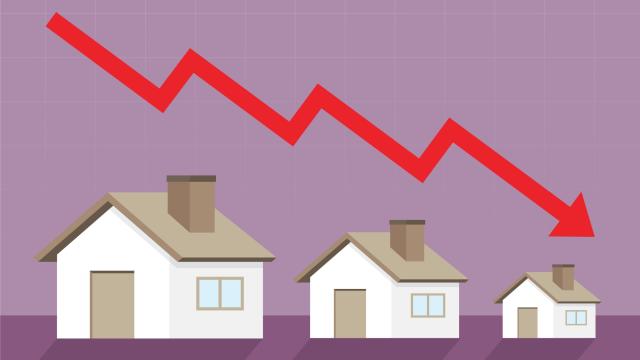Table of Contents
Understanding the Causes
Economic Factors
A real estate housing market crash often stems from underlying economic issues such as recession, unemployment spikes, or interest rate fluctuations. When consumer confidence wanes and disposable income decreases, the demand for housing dwindles, causing property values to plummet.
Policy Changes
Government policies, including changes in lending regulations or tax laws, can significantly impact the real estate market. For instance, tightening mortgage lending standards can restrict access to financing, thereby reducing homebuyers’ purchasing power and dampening demand.
Speculative Behavior
Speculative bubbles, fueled by irrational exuberance and unrealistic expectations of future price appreciation, can lead to unsustainable growth followed by a sudden collapse. Speculators may engage in risky practices such as flipping properties for quick profits, exacerbating market volatility.
Impact on Homeowners
Decrease in Property Values
A housing market crash often results in a sharp decline in property values, leaving homeowners with mortgages that exceed their home’s worth. This negative equity can make it challenging to sell or refinance, trapping homeowners in precarious financial situations.
Foreclosure Risk
As property values plummet and kluweralert.com struggle to meet mortgage payments, the risk of foreclosure looms large. Foreclosure not only leads to the loss of one’s home but also tarnishes credit scores, making it harder to secure future housing or financing.
Equity Loss
Homeowners who’ve built equity in their properties over the years may see their wealth erode overnight during a market downturn. This loss of equity not only affects their net worth but also hampers their ability to leverage home equity for financial purposes such as home improvements or debt consolidation.
Effects on Renters
Rising Rental Prices
In the wake of a housing market crash, rental prices often surge as displaced homeowners seek alternative housing options. This increased demand, coupled with limited supply, can push rental rates beyond affordability for many renters, exacerbating housing insecurity.
Eviction Threats
Rental properties may change hands during a market downturn, leading to eviction threats for tenants as new owners seek to maximize profits or redevelop properties. Renters facing eviction may struggle to find suitable housing amidst heightened competition and rising rents.
Limited Housing Options
As foreclosed properties flood the market and rental vacancies dwindle, renters may find themselves with limited housing options, especially in high-demand urban areas. Affordable housing becomes increasingly scarce, forcing renters to compromise on location, size, or quality.
Navigating the Market as a Buyer
Identifying Bargain Opportunities
A housing market crash presents unique opportunities for savvy homebuyers to snag properties at discounted prices. By keeping a close eye on distressed sales, short sales, or bank-owned properties, buyers can capitalize on bargain opportunities in a down market.
Securing Financing
Obtaining financing during a housing market downturn may require extra diligence, as lenders tighten their lending standards to mitigate risk. Prospective buyers should focus on improving their credit scores, saving for larger down payments, and exploring alternative financing options such as FHA loans or seller financing.
Negotiating with Sellers
In a buyer’s market, sellers may be more willing to negotiate on price, closing costs, or other terms to facilitate a sale. Buyers should leverage this negotiating power to secure favorable deals and maximize their purchasing power in a challenging market.
Strategies for Sellers
Pricing Adjustments
Sellers must be realistic about pricing their properties in a downturn, taking into account market conditions, comparable sales, and the need for a quick sale. Overpricing can deter potential buyers and prolong the selling process, leading to further price reductions down the line.
Enhancing Property Appeal
To stand out in a competitive market, sellers should focus on enhancing their property’s curb appeal and interior presentation. Simple upgrades such as fresh paint, landscaping improvements, or staging can make a significant difference in attracting buyers and commanding higher offers.
Alternative Selling Methods
In challenging market conditions, sellers may need to think outside the box and explore alternative selling methods such as auctions, lease options, or seller financing. These creative approaches can help sellers attract buyers who may be unable to secure traditional financing or qualify for mortgages.
Surviving Financially
Budgeting Wisely
During uncertain times, prudent financial management is crucial for weathering economic downturns. Homeowners and renters alike should prioritize essential expenses, trim discretionary spending, and build emergency savings to cushion against unexpected financial shocks.
Exploring Loan Options
Homeowners facing mortgage hardships should proactively communicate with their lenders to explore loan modification or refinancing options. Government programs such as HARP or FHA streamline refinancing may offer relief to struggling homeowners, allowing them to stay afloat amidst financial challenges.
